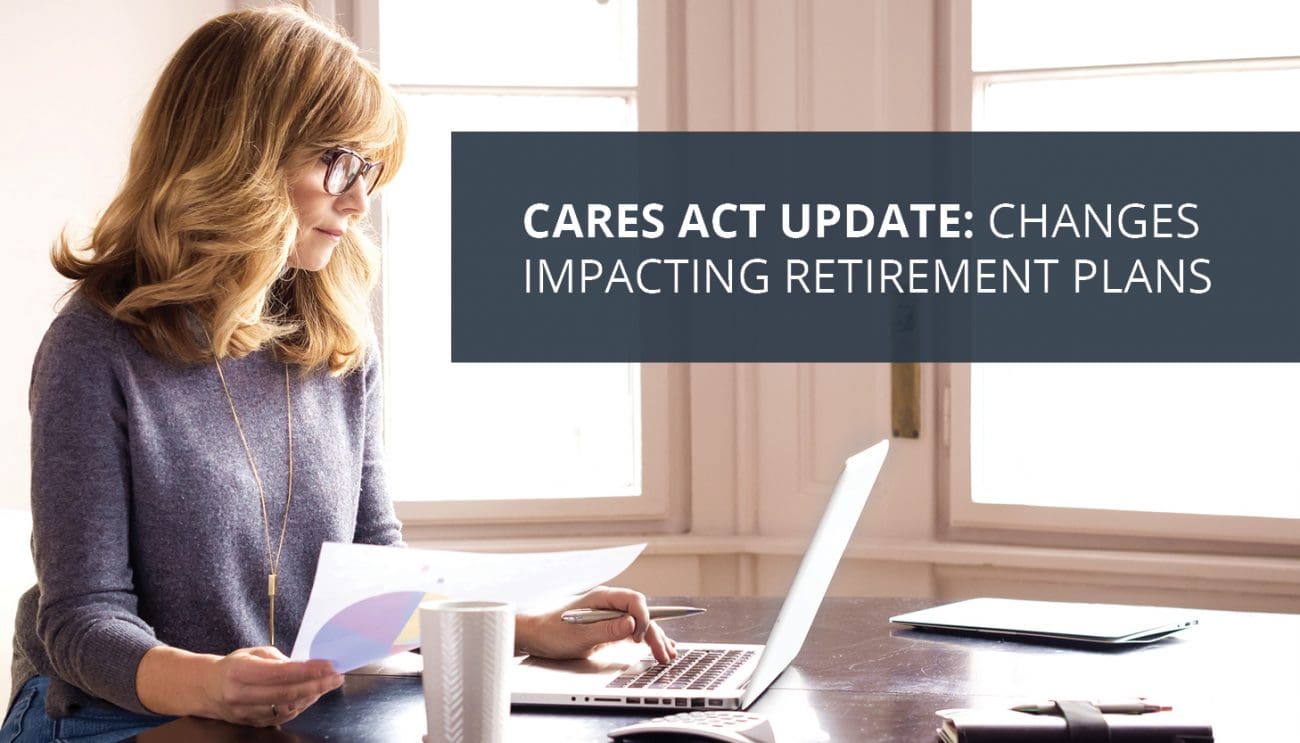Signed into effect on March 27, the Coronavirus Aid, Relief and Economic Security (CARES) Act is a robust economic stimulus package designed to help small business owners and hardworking American families during these unprecedented times.
For small businesses, the new regulation allows access to capital to help maintain operations. For employees, it grants new ways that they can use their retirement plan savings for emergency financial relief. Additionally, for qualifying individuals, there are other features available that strive to alleviate financial anxiety around tax filing deadlines, HSA payments, student loans, and the new $1200 recovery rebate checks.
This article will focus on the information that plan sponsors should know about retirement plan changes and what questions to anticipate from employees.
Who is Eligible for CARES
Before we dive into these three changes, let’s start with eligibility. The new CARES Act is specific to individuals affected by coronavirus. For plan participants to qualify, that individual needs to claim they meet these requirements:
– An individual who:
1. Is diagnosed with the virus by a test approved by the CDC
2. Has a spouse or dependent that is diagnosed with the virus by a test approved by the CDC
3. Experiences adverse financial consequences as a result of being quarantined, being furloughed or laid off or having work hours reduced due to such virus or disease, being unable to work due to lack of child care due to such virus or disease, closing or reducing hours of a business owned or operated by the individual due to such virus or disease, or other factors as determined by the Secretary of the Treasury.
– Additionally, they need to take the distribution before 12/31/20.
While that definition does appear to cover all workers, it’s important to let your employees know which of the qualifying exemptions they might claim in the future. Two valuable things to note:
· plan sponsor verification is not required, you may rely on participant certification that the above condition(s) are met.
· ALWAYS document your actions.
3 Major Coronavirus-related Retirement Plan Changes
Now that your participants are eligible to qualify for Coronavirus-related changes. Here are some of the major updates impacting retirement plans.
1. Plan loans
If your plan allows for loans, then participants may take a plan loan for the lesser of $100,000 or 100% of the vested account balance.
Example
Alex has $200,000 vested in their retirement account
They can take a plan loan of $100,000
Alex is eligible for a $100,000 plan loan
Jordan has $50,000 vested in their retirement account
They can take a plan loan of 100%
Jordan is eligible for a $50,000 plan loan
If your plan does not allow loans. You can amend your plan to allow for the new option(s). However, plans do not have to offer the expanded Coronavirus-related distribution or loan options. This is a fiduciary decision and should be considered thoughtfully.
2. Existing plan loans
If any participants have existing plan loans and for qualifying employees, their scheduled repayments and any accrued interest can be delay for the remainder of the year (12/31/20). As a best practice, direct your employee to contact the plan’s administrator for their specific loan repayment details.
3. Withdrawals (Different than Hardship Withdrawals)
The CARES Act created a new type of withdrawal from retirement plans. It is separate and unique from traditional Hardship Withdrawals. The differences are:
– the distribution is not subject to the 10% early withdrawal penalty (withdrawals made from a qualified retirement account, such as 401(k) or IRA, prior to age 59 ½ are generally subject to a 10% penalty in addition to any deferred taxes due)
– participants will not have the 20% withheld on the distribution (individuals will have to pay ordinary income taxes on it in the future)
– distributions need to happen between Jan. 1, 2020 and Dec. 31, 2020
– within 3 years, the participant can payback the withdrawal and avoid some penalties (clarification still needed)
– individuals can take coronavirus-related distributions up to $100,000
One reminder, while these times are difficult for everyone, as the plan sponsor, you have the ability to decide if your plan will offer the Coronavirus-related distribution withdrawal. This will mean amending your plan for these new options. While you can start utilizing any of these provisions immediately, it is best to setup a call with your third party administrator to discuss the details.
Common questions
In addition to the new ways to access retirement plan accounts, many employees are going to have questions about rebate checks and other CARES Act changes.
How much can I expect from the coronavirus stimulus check and when will it arrive?
For employees that earn under $75,000 per year, they should receive a $1,200 stimulus check. For employees earning up to $99,000, they will receive a reduced stimulus check. The payments are reduced by $5 for every $100 in income above $75,000. Additionally, for employees with children, each child may add another $500 to the stimulus check. The stimulus checks are anticipated to arrive in April.
Does the CARES Act include student loan relief?
Yes, if the employee has federal student loans, they can pause payment for the next six months (through September 30, 2020) and during this time interest is waived.
Also, as an employer, under the new CARES Act, you may contribute up to $5,250 annually toward your employee’s student loans, and that amount would be excluded from the employee’s income.
How have health savings accounts changed?
The CARES Act has increased access to telehealth networks and expands the list of qualifying expenses. It best to contact your HSA provider for specifics.
Does the CARES Act include relief for small businesses?
If you are a small business owner with under 500 employees that has been financially impacted by COVID-19 and meet the application requirements, then you could apply for a federally backed loan. For more information, click here: https://covid19relief.sba.gov/#/
While these seem like a lot of changes, the CARES Act cuts the red tape and provides an avenue to those most impacted by coronavirus the ability to access their financial accounts.
As an employer, right now we understand it can be an incredibly stressful time. That is why we are here to keep you informed and updated on how new regulation may impact your company’s retirement plan and your employees. This knowledge is another way that you can educate your employees to make smart financial decisions and help you continue offering this incredibly value company benefit.

Joanna Amberger
CERTIFIED FINANCIAL PLANNER™
3 Financial Group
1888 Kalakaua Avenue, Suite C312
Honolulu, HI 96815
808.791.2925
www.3FinancialGroup.com
Running a successful business is complicated and your retirement plan is an important piece of the puzzle. Regulators are putting increasing pressure on business owners who run retirement plans for their employees. Working with a financial advisor who can support you with your fiduciary requirements can help ease that burden. Plus you can have a plan that is easy to manage, while providing your employees with a convenient vehicle to save for retirement. We work with you to design and implement smart retirement plans that fit your unique goals.
Sources
“Coronavirus Aid, Relief, and Economic Security Act or the CARES Act.” Congress.gov. Mar 2020.
This information was developed as a general guide to educate plan sponsors and is not intended as authoritative guidance or tax/legal advice. Each plan has unique requirements, and you should consult your attorney or tax advisor for guidance on your specific situation. © 401k Marketing, LLC. All rights reserved. Proprietary and confidential. Do not copy or distribute outside original intent.



